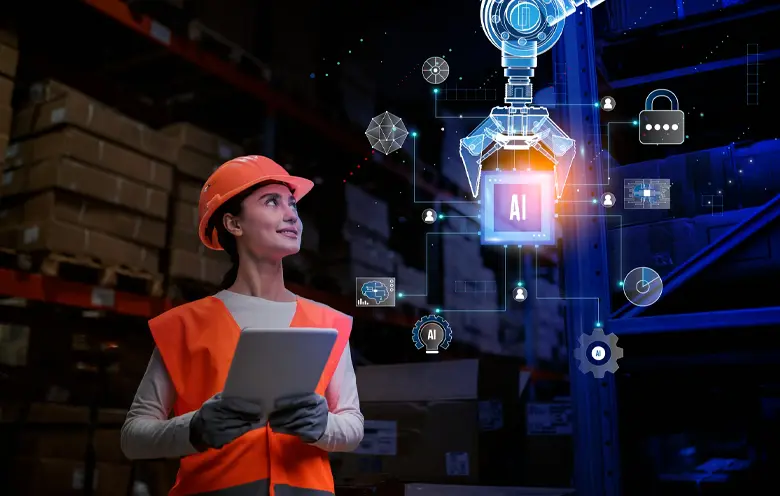Supply chains are gradually getting globalized and more complex because raw materials and products travel across many geographical locations and navigate through multiple manufacturers, distributors, suppliers, service providers and carriers. Hence, supply chain organizations face challenges such as lack of visibility and inventory balance due to manual intervention, point-to-point communication.
Another major challenge for supply chain today is the inability to store and process the massive amount of gathered data. Every year millions of invoices, purchase orders (PO), bills of lading and records are manually processed. Fast-moving supply chain companies are also struggling to perform these repetitive processes efficiently without error.
Apart from that, supply chain companies also find difficulty in constantly monitoring and mitigating various types of potential disasters due to events such as delivery delays, poor weather conditions, quality defects, natural calamities and more.

AI strategy and planning workshop
Artificial intelligence is transformational, and adopting this technology will enable companies to reshape their strategic vision so that they no longer rely on what they think is true, rather, leverage factual-based decision-making capabilities.
Artificial intelligence (AI) technology along with its subsets, machine learning (ML) and natural language processing (NLP), play a pivotal role in addressing all these challenges and optimizing the modern supply chain. AI can analyze a huge amount of generated data to derive insights for making better decisions to streamline supply chain management. Thus, with an AI-based solution, organizations can build a more intelligent, agile and customer-centric supply chain.
By 2020, 50 % of mature supply chains will use AI and advanced analytics for planning, and to eliminate sole reliance on short-term demand forecasts. – IDC
Here’s how AI can benefit your supply chain business
By implementing AI applications, you can not only eliminate manual errors and reduce time consumption in performing tedious tasks, but it can also benefit you in many ways.
1. Improves supply chain planning (SCP)
Supply chain planning (SCP) is an end-to-end process of organizing assets to optimize the delivery of goods, services and information from suppliers to customers and balancing supply and demand. With AI integration, you can effectively manage your supply chain and demand. AI-enabled supply chain management (SCM) solutions can help you to manage the safety of inventory levels, plan the transportation network, manage purchases and supplies and forecast demands.
By using AI, you can gain complete visibility into SCM functionality and extract insights about any risks associated with the supply chain process. AI techniques can track distractions and predict interruptions in the supply chain with the help of the collected data. This data is gathered from various sources, such as weather predictions, social media, historical information and more.
2. Serves as virtual assistants
With increasing advancements in AI, virtual assistants like chatbots are available 24/7 to offer real-time support to customers. The chatbot enables personalized conversations with customers about shipment-related queries and other service offerings. Also, chatbots can provide customers with an easy way to find nearest shipping branches, check shipments status, share preferred delivery locations and schedule deliveries for personalized parcels.
3. Improves transporter selection and relationship management
In today’s fast-moving SC environment, improving execution and the supply base through an effective transporter relationship with the supplier has become challenging to achieve. However, with the use of ML algorithms, you can analyze transporter-related data including audits, credit scoring, on-time in-full delivery performance, evaluations and live vehicle tracking to make decisions to improve the efficacy of supplier and transporter relationship management.
4. Improves warehouse management
AI and ML algorithms can transform warehousing in terms of inventory, warehouse operations, communication, productivity, wages, robots and more. With AI-enabled automated robots, the processes of picking, unloading a pallet and packing items become faster. Such AI robots for warehouse management manage a huge volume of goods by automating operations and quickly transporting items within a warehouse.
Apart from that, every day a warehouse produces a massive amount of data from order numbers, inventory stock levels and shipping data. Using ML, you can simplify data analysis to identify patterns and predict out of stock items, orders and returns thereby enhancing your customer service.
The final say
Many companies have made big strides in developing and deploying practical applications of AI in supply chain management and planning such as DHL and Amazon. With a scalable AI solution, your supply chain business can receive real-time information, increase operational efficiency and improve overall profit. If you are looking to deploy an AI solution for your supply chain business, talk to our experts.




